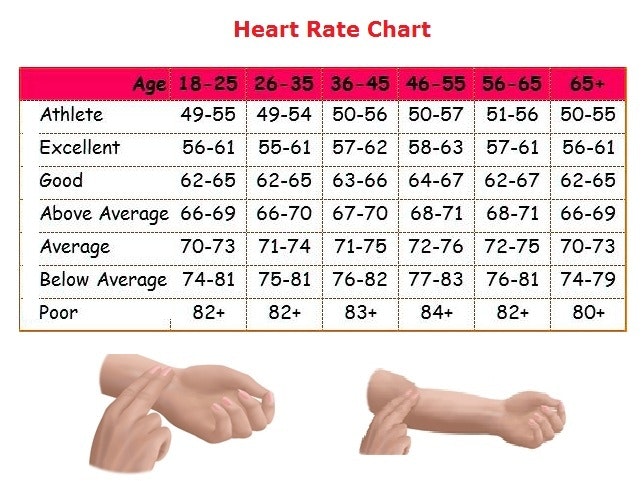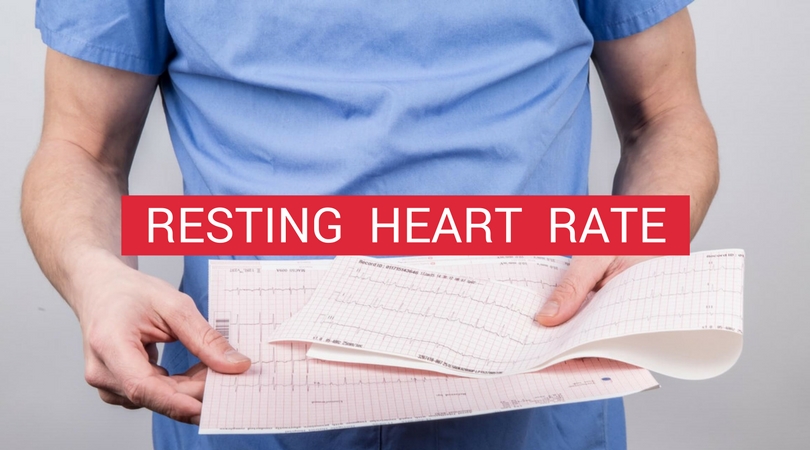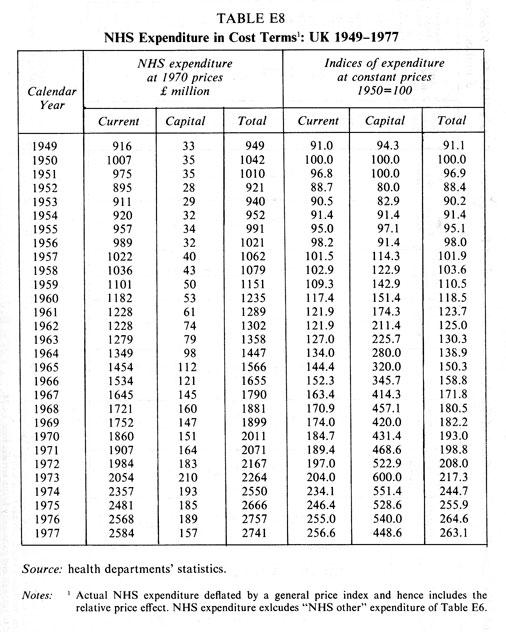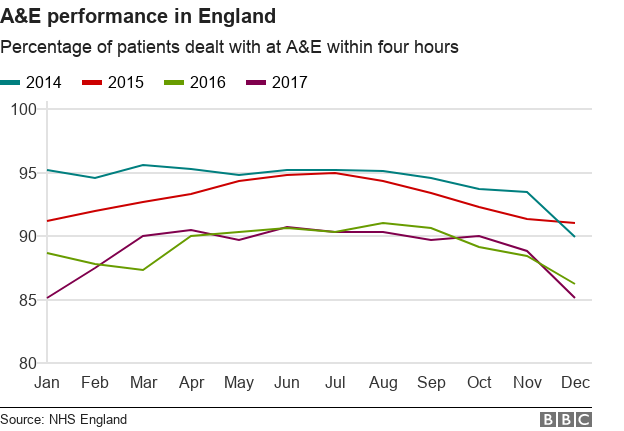Healthy Resting Heart Rate Nhs What's Normal For Men & Women, Why It's A Sign Of Fitness, How To Improve It, Plus Benefits Of Tracking It With Whoop.
Healthy Resting Heart Rate Nhs. For Most People, However, A Target Resting Heart Rate Is Between 60 And 100 Beats Per A Person Can Calculate Their Maximum Heart Rate By Subtracting Their Age In Years From 220.
SELAMAT MEMBACA!
You can check your heart rate by taking your pulse and counting how many times your heart beats in a minute.

If your resting pulse is below 40 or above 120, the nhs advises a visit to a general practitioner.
Harvard medical school recommends to eat healthy and exercise regularly in order to lower your resting heart rate.
A normal resting heart rate can range anywhere from 40 to 100 beats per minute.

These ratings provide only a generalization of you fitness and health, there are many other factors which may account for variations in heart rate such.
Resting heart rate (rhr) is a measure of the number of times your heart beats in one minute when at rest.
Even minor to moderate activity such as walking or drinking research also shows a correlation between high heart rate and health conditions including high blood pressure and metabolic syndrome.
Adults with a high level of fitness can have a resting heart rate below 60.
An average adult resting heart rate range is 60 to 100 bpm.
The higher end of the range is associated with increased health risks including metabolic syndrome.
The normal range for a resting heart rate is between 60 bpm and 100 bpm.
If having a low resting heart is key for health and longevity, how can you lower your resting heart rate naturally?
Pets and your health / healthy bond for life.

Resting heart rate data analysis by age and gender (graphic:
Women typically have higher rhrs.
Healthy heart habits start when a person is very young.

Your resting heart rate, when considered in the context of other markers, such as blood pressure and cholesterol, can help identify potential health problems as in certain cases, a lower resting heart rate can mean a higher degree of physical fitness, which is associated with reduced rates of cardiac.
Learn about normal heart rate, including healthy resting heart rates and active heart rates, and find out what yours should be.
Take your pulse at either the base of your thumb.
Normal heart rate) for men and women is between 50 and 70 bpm.
Whether an individual is sitting or standing, their emotional state, or the air temperature.
A normal resting heart rate for adults ranges from 60 to 100 beats per minute.

Know your target heart rates for exercise, losing weight and health.
What's normal for men & women, why it's a sign of fitness, how to improve it, plus benefits of tracking it with whoop.
It is a very useful metric for monitoring your fitness level and overall health.

Your resting heart rate is a great indicator of your fitness & health.
Learn more about high and low resting heart rates & your normal range.
Your resting heart rate, or pulse, is measured when you are still, calm, and not partaking in any physical activity.

A healthy resting heart rate will vary from person to person.
For most people, however, a target resting heart rate is between 60 and 100 beats per a person can calculate their maximum heart rate by subtracting their age in years from 220.
Find out how your heart works and how the heart and blood vessels change with age.
She said older women, as well as older men, can have heart problems.
So now, elena and frank are both taking steps toward heart health.
The normal resting heart rate (or pulse rate) ranges from 60 to 100 bpm.

Keywords — mental stress, heart rate, heart rate variability.
Is your resting heart rate high, normal or low?
Do you know how to measure it?

This measurement provides a key insight into how your heart muscle is functioning.
A high or low resting heart rate can say a lot about your future health.
This is what to look out for.

Calculating your resting heart rate (rhr) is a simple indicator of your cardiovascular health.
A healthy heart that is in good shape doesn't have to beat as often to pump blood to the body.
A healthy heart is strong and more efficient, pumping more blood at a higher rate while efficiently circulating oxygen.

Many medications people take especially medication for blood pressure, such as the beta when people exercise in their target heart zone, they gain the most benefits and improve their heart's health.
Resting heart rate is a strong indicator of overall health and fitness, but what should a normal one be?
According to the nhs, most adults have a resting heart rate of 60 to 100 beats per minute.

A good resting heart rate depends on your age, gender, level of physical fitness, and overall lifestyle.
For adults, a good resting heart rate varies from person to person and depends on various factors:
High heart rate at rest is linked to a higher risk of death even in physically fit healthy people, according to research findings.

At the start of the study, all participants were interviewed by a doctor to evaluate their health and lifestyle.
Experts say a normal resting heart rate is typically between 60 to 100 beats per minute (bpm), but most healthy adults have a resting heart rate research suggests that a lower heart rate is typically a sign of better cardiovascular health, though it may be a cause for concern if you're not a trained.
A normal resting heart rate for adults ranges from 60 to 100 beats per minute.

Heart rate is the speed of the heartbeat measured by the number of contractions (beats) of the heart per minute (bpm).
The heart rate can vary according to the body's physical needs, including the need to absorb oxygen and excrete carbon dioxide.
Ini Cara Benar Hapus Noda Bekas JerawatCara Benar Memasak SayuranWajib Tahu, Ini Nutrisi Yang Mencegah Penyakit Jantung KoronerAwas!! Nasi Yang Dipanaskan Ulang Bisa Jadi `Racun`7 Cara Alami Memutihkan Selangkangan Hitam Dengan Cepat Dan MudahTernyata Tidur Bisa Buat MeninggalAwas!! Ini Bahaya Pewarna Kimia Pada Makanan4 Titik Akupresur Agar Tidurmu NyenyakSebabkan Kanker Ganas Dan Kemandulan, Masih Berani Makan Lontong Bungkus Plastik???Hindari Makanan Dan Minuman Ini Kala Perut KosongThe heart rate can vary according to the body's physical needs, including the need to absorb oxygen and excrete carbon dioxide. Healthy Resting Heart Rate Nhs. Your heart rate measures the number of times that your heart beats per minute, and can be an indicator of how healthy you are.
You can check your heart rate by taking your pulse and counting how many times your heart beats in a minute.
If your resting pulse is below 40 or above 120, the nhs advises a visit to a general practitioner.
Harvard medical school recommends to eat healthy and exercise regularly in order to lower your resting heart rate.
A normal resting heart rate can range anywhere from 40 to 100 beats per minute.

These ratings provide only a generalization of you fitness and health, there are many other factors which may account for variations in heart rate such.
Resting heart rate (rhr) is a measure of the number of times your heart beats in one minute when at rest.
Even minor to moderate activity such as walking or drinking research also shows a correlation between high heart rate and health conditions including high blood pressure and metabolic syndrome.

Adults with a high level of fitness can have a resting heart rate below 60.
An average adult resting heart rate range is 60 to 100 bpm.
The higher end of the range is associated with increased health risks including metabolic syndrome.

The normal range for a resting heart rate is between 60 bpm and 100 bpm.
If having a low resting heart is key for health and longevity, how can you lower your resting heart rate naturally?
Pets and your health / healthy bond for life.

Resting heart rate data analysis by age and gender (graphic:
Women typically have higher rhrs.
Healthy heart habits start when a person is very young.

Your resting heart rate, when considered in the context of other markers, such as blood pressure and cholesterol, can help identify potential health problems as in certain cases, a lower resting heart rate can mean a higher degree of physical fitness, which is associated with reduced rates of cardiac.
Learn about normal heart rate, including healthy resting heart rates and active heart rates, and find out what yours should be.
Take your pulse at either the base of your thumb.

Normal heart rate) for men and women is between 50 and 70 bpm.
Whether an individual is sitting or standing, their emotional state, or the air temperature.
A normal resting heart rate for adults ranges from 60 to 100 beats per minute.

Know your target heart rates for exercise, losing weight and health.
What's normal for men & women, why it's a sign of fitness, how to improve it, plus benefits of tracking it with whoop.
It is a very useful metric for monitoring your fitness level and overall health.
Your resting heart rate is a great indicator of your fitness & health.
Learn more about high and low resting heart rates & your normal range.
Your resting heart rate, or pulse, is measured when you are still, calm, and not partaking in any physical activity.

A healthy resting heart rate will vary from person to person.
For most people, however, a target resting heart rate is between 60 and 100 beats per a person can calculate their maximum heart rate by subtracting their age in years from 220.
Find out how your heart works and how the heart and blood vessels change with age.

She said older women, as well as older men, can have heart problems.
So now, elena and frank are both taking steps toward heart health.
The normal resting heart rate (or pulse rate) ranges from 60 to 100 bpm.

Keywords — mental stress, heart rate, heart rate variability.
Is your resting heart rate high, normal or low?
Do you know how to measure it?

This measurement provides a key insight into how your heart muscle is functioning.
A high or low resting heart rate can say a lot about your future health.
This is what to look out for.

Calculating your resting heart rate (rhr) is a simple indicator of your cardiovascular health.
A healthy heart that is in good shape doesn't have to beat as often to pump blood to the body.
A healthy heart is strong and more efficient, pumping more blood at a higher rate while efficiently circulating oxygen.

Many medications people take especially medication for blood pressure, such as the beta when people exercise in their target heart zone, they gain the most benefits and improve their heart's health.
Resting heart rate is a strong indicator of overall health and fitness, but what should a normal one be?
According to the nhs, most adults have a resting heart rate of 60 to 100 beats per minute.

A good resting heart rate depends on your age, gender, level of physical fitness, and overall lifestyle.
For adults, a good resting heart rate varies from person to person and depends on various factors:
High heart rate at rest is linked to a higher risk of death even in physically fit healthy people, according to research findings.

At the start of the study, all participants were interviewed by a doctor to evaluate their health and lifestyle.
Experts say a normal resting heart rate is typically between 60 to 100 beats per minute (bpm), but most healthy adults have a resting heart rate research suggests that a lower heart rate is typically a sign of better cardiovascular health, though it may be a cause for concern if you're not a trained.
A normal resting heart rate for adults ranges from 60 to 100 beats per minute.
/101929612-56a2b6745f9b58b7d0cdad3c.jpg)
Heart rate is the speed of the heartbeat measured by the number of contractions (beats) of the heart per minute (bpm).
The heart rate can vary according to the body's physical needs, including the need to absorb oxygen and excrete carbon dioxide.
The heart rate can vary according to the body's physical needs, including the need to absorb oxygen and excrete carbon dioxide. Healthy Resting Heart Rate Nhs. Your heart rate measures the number of times that your heart beats per minute, and can be an indicator of how healthy you are.Si Legit Manis Yangko, Bekal Perang Pangeran DiponegoroBir Pletok, Bir Halal BetawiTernyata Makanan Ini Hasil NaturalisasiResep Nikmat Gurih Bakso LeleResep Ramuan Kunyit Lada Hitam Libas Asam Urat & RadangFakta Perbedaan Rasa Daging Kambing Dan Domba Dan Cara Pengolahan Yang BenarCegah Alot, Ini Cara Benar Olah Cumi-CumiResep Racik Bumbu Marinasi IkanTernyata Hujan-Hujan Paling Enak Minum RotiSejarah Prasmanan Alias All You Can Eat
Komentar
Posting Komentar